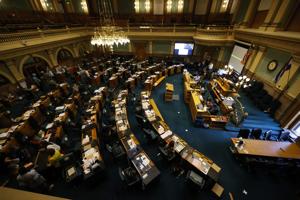Op-Ed: Colorado deserves better than ‘leave it blank’ lawmaking

In high school or college, we all remember exam questions we couldn’t answer. Unless it was multiple choice, usually the best move was to leave the question blank and finish the rest of the test.
For an individual student, that’s fine. The consequences of that unanswered question are limited to just one person and their grades.
But you can’t say the same thing about the “leave it blank” approach to lawmaking. When the exam is a piece of legislation, skipping over the tough questions creates problems for everyone, not just the lawmakers who wrote the bill.
Let’s review two recent examples from Colorado: One that became law and one that didn’t.
In 2019, Colorado lawmakers passed Senate Bill 181, which overhauled the system for regulating the state’s oil and natural gas industry. It was introduced just months after Colorado voters had rejected a 2018 ballot measure – Proposition 112 – to dramatically widen setbacks between new oil and gas production sites, occupied buildings and other locations.
In response to critics, the authors of SB 181 offered repeated assurances that wider setbacks were not part of the bill.
“This bill does not mention anything about setbacks,” Senate Majority Leader Stephen Fenberg, co-author of SB 181, told one of the committees that reviewed the bill. “This bill does not create any statewide setbacks. It does not even say the word setback.”
Former House Speaker KC Becker, also an SB 181 co-author, stated the bill “doesn’t even mention setbacks” during another committee hearing. “It is not a statewide setback.”
I actually testified on a couple of occasions about SB 181, concerning the lack of specifics in the bill, the confusion this could create, and the potential consequences for K-12 education and school construction programs funded with oil and gas tax revenue, lease payments and production royalties.
In response to concerns from business, industry and rank-and-file oil and gas workers, the bill’s authors imposed a limit on SB 181: New regulations would have to be “necessary and reasonable,” they wrote into the bill.
But what does necessary and reasonable mean? There was no definition. The authors left the answer blank.
The result? In late 2020, the newly reorganized Colorado Oil and Gas Conservation Commission imposed – you guessed it – new statewide setbacks. For occupied buildings, the setback is now 2,000 feet. When combined with other changes, industry officials have said the new rule comes very close to the 2,500-foot distance voters rejected in 2018.
COGCC officials have promised they will be flexible and provide exceptions to the setback, so that Colorado’s oil and gas producing regions can still operate. Time will tell if that’s true. At some point, I’m sure the courts will be asked to hold the COGCC accountable for imposing a new setback despite the clear intentions of SB 181’s authors.
But that could take years, and this whole situation could have been avoided if the authors of SB 181 had spent more time on the details.
The next example of “leave it bank” legislating is a proposed health care bill, House Bill 1349, which was introduced during the 2020 legislative session but did not pass. The bill would have created the so-called public option in Colorado, a government-controlled health care plan designed to undercut private health insurance premiums and pay hospitals less for treating patients.
As someone who has worked with health care practitioners and administrators on public policy, I can say that even before COVID-19, the proposed public option was a major worry for people on the front lines of our healthcare system.
In late 2019, for example, the Polis administration released an analysis of the public option showing the new government plan would help wealthier households – but low- and middle-income families would have to pay more.
This called into question the entire purpose of the public option. But when HB 1349 was drafted in early 2020, the bill offered no answers. Instead, the authors – Rep. Dylan Roberts, D-Avon, and Sen. Kerry Donovan, D-Vail, – instructed the Colorado Insurance Commissioner to “mitigate any adverse impacts the Colorado Option Plan has on the purchasing power of [individual health insurance] exchange consumers whose income is up to four hundred percent of the federal poverty line.”
Think about that: The authors knew the public-option bill would have adverse impacts for many working families, but instead of solving the problem, they asked someone else to do it, and only after the bill had become law. One of the biggest questions about a public option was going to be left unanswered in the bill to create the public option.
The proposed public option is probably coming back in 2021, but “leave it blank” legislating is a bigger problem than just one bill.
Whenever a new law is proposed, people deserve to know what it will and won’t do up front, not after the fact. Rushing bills through the legislative process, and letting obscure agency officials fill in all the blanks, shuts people out of the democratic process and makes our already divided politics even worse.
Disclaimer: This content is distributed by The Center Square
